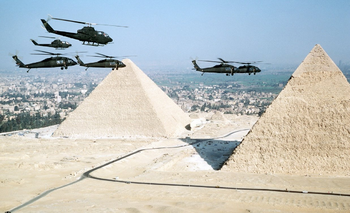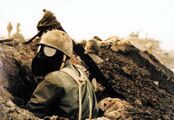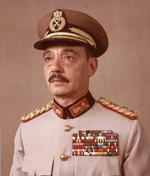Invasion of Sulekh: Difference between revisions
| Line 153: | Line 153: | ||
===Revelation of Vaillais involvement in nuclear program=== | ===Revelation of Vaillais involvement in nuclear program=== | ||
In late 1992, Arcadian occupation troops from the [FORMATION] processing Sulekhi government records uncovered a bundle of correspondences between Vaillais Col. David Stern, who served as Gerard Hugo's Undersecretary of Defense for Research and Development throughout his regime, and Faroukh-Ihab Maher, program manager for the Sulekhi nuclear program. The document immediately drew suspicion, as Maher was known to be one of the key leaders in the program, and was in fact in custody in [NEUTRAL CITY] awaiting trial for crimes against humanity. This correspondence contained detailed information on nuclear weapon construction, and seemed to indicate that the Hugo regime was involved in the construction of the Sulekhi nuclear weapon. Further investigation revealed the depth of Vaillais involvement, including a short-lived parallel program undertaken at the Brengonne State Armory. | In late 1992, Arcadian occupation troops from the [FORMATION] processing Sulekhi government records uncovered a bundle of correspondences between Vaillais Col. [[David Stern]], who served as [[Gerard Hugo]]'s Undersecretary of Defense for Research and Development throughout his regime, and [[Faroukh-Ihab Maher]], program manager for the Sulekhi nuclear program. The document immediately drew suspicion, as Maher was known to be one of the key leaders in the program, and was in fact in custody in [NEUTRAL CITY] awaiting trial for crimes against humanity. This correspondence contained detailed information on nuclear weapon construction, and seemed to indicate that the Hugo regime was involved in the construction of the Sulekhi nuclear weapon. Further investigation revealed the depth of Vaillais involvement, including a short-lived parallel program undertaken at the Brengonne State Armory. | ||
[insert paragraph about how the arcadian government reacted internally to the news that vailleux was involved] | [insert paragraph about how the arcadian government reacted internally to the news that vailleux was involved] | ||
Revision as of 13:53, 7 August 2023
| Invasion of Sulekh | |||||||
|---|---|---|---|---|---|---|---|
Clockwise from the top: Arcadian helicopters enter Aqqat after the Fall of Aqqat, Zubaydi figher pilot returns after striking Sulekhi forces, landing of Thalassic paras during Operation Scarab II, Sarvatian armored forces unload after successful JSEC-supported amphibious assault, Sulekhi soldier fights for position in the Madinat Sirun Exclusion Zone. | |||||||
| |||||||
| Belligerents | |||||||
|
Supported by: |
Supported by: | ||||||
Background
Beginnings of the Junta
In 1947, following the decolonization of Sulekh in the aftermath of the Second Great War, a loose coalition of Sulekhi and Zubaydi political figures attempted to form a new pan-Katti republic in the form of the Republic of Sulekh. Initially a one-party state under the Katti National Unity Movement (KNUM), the new republic faced the enormous challenge of uniting and integrating numerous separate former colonies into a unified nation state. Political infighting, a lack of foreign support, and an uncooperative Army caused years of painful stagnation for Sulekh.
By the end of 1949, the Sulekhi Army had grown in size and power around a core of veteran anti-colonial fighters and colonial troops that had served overseas in the armies of their colonizers. With the central government in Aqqat almost paralyzed by infighting, Major General Abdul al-Hasan unilaterally and without permission of the government nationalized the huge foreign-owned oil fields near Qus; on December 3rd, Sulekhi troops entered the fields and arrested hundreds of foreign managers, mostly Arcadians. Major General al-Hasan claimed the oil belonged to the people of Sulekh and that the central government had been selling out the nation to foreign buyers. The reality was that Parliament had been debating nationalizing the oil for months, though this was not widely known to the Sulekhi people.
When Prime Minister Bakr Khulusi attempted to recall Major General al-Hasan, the General returned lawfully on December 7th and was placed under house arrest for his actions. Radio stations across the capital claimed the government was selling out a hero of Sulekh and planning to hand al-Hasan over to the Erisians for his crime, causing riots in the streets. When the riots became too much to control, the 1. Infantry Regiment under Colonel Khatib ibn Faisal entered the capital under the guise of restoring order. Colonel Khatib released al-Hasan, who rallied the people and 1. Regiment, leading them to Parliament and announcing the government to be dissolved on December 9th, 1949.
On December 21st, al-Hasan was declared Interim Prime Minister by a Parliament composed entirely of officers he'd appointed, and he formed a government, abolished the constitution, and forced the adoption of an entirely new one. With no term limits, nearly unlimited executive authority, and a list of loopholes available to him to circumvent Parliament, al-Hasan was effectively dictator of Sulekh.
Beginning of Nuclear Weapons Program
The economy of Sulekh improved only gradually after the December 9th Coup, and al-Hasan grew worried that continued republic-era stagnation would eventually lead to his own ouster. Starting in 1953 after the Republican coup in Vailleux, al-Hasan's government inked a series of important economic cooperation deals with one of their former colonizers, primarily concerned around preferential oil prices in exchange for Vallais guarantees to import a minimum amount per year. Over the following years, these deals turned into genuine cooperation on both economic and security issues. As Sulekh's international image slowly recovered, their non-aligned status allowed them to secure arms deals with numerous foreign states, though primarily Vailleux.
Disputes with multiple regional powers like Kerman, Cyrenia, Sarvatia, and Argea motivated the junta government to spend a very large portion of the national GDP on defense, though al-Hasan continued to maintain a mostly dove-ish foreign policy with the larger powers so as to not antagonize them until Sulekh was strong enough to stand on its own. Memos recovered from Sulekhi archives in the post-war years indicate that al-Hasan first expressed interest in nuclear weapons in 1955, despite the international ban on them signed by virtually every state in the world, including Sulekh.
After Gerard Hugo's ascent to power in 1956, his government covertly approached al-Hasan's junta in regards to constructing a nuclear weapon research facility in Sulekh, and an agreement was reached to turn the military base at Kafr Ombo into a secretive closed research facility, eventually called Madinat Sirun. While the tempo of research was slow, and other projects tended to be focused on at Madinat Sirun, a combined team of Sulekhi and Vallais scientists continued work at the site for 8 years, from 1957 to 1965, under the leadership of Henri Gaillard. For a short time the project was put on hold while Vailleux dealt with its colonial crises, and then canceled altogether after the 1967 assassination of Hugo. Dr. Gaillard would attempt to finish his work in Vailleux, but the new government was not amenable to his work and he fled the country when he became paranoid about the possibility of assassination for the purposes of covering up a Vallais nuclear program.
Rise of Salah al-Nazim
After over two decades in power, Major General and Prime Minister Abdul al-Hasan died of a stroke on April 16th, 1972. While the death was sudden and unexpected, the old officer had made great efforts to keep a line-of-succession secure in the event of his death, and Lieutenant General Ubaydullah al-Khalib was chosen by Parliament the next day as the new Prime Minister. Less than a week later, al-Khalib would die under mysterious circumstances when his plane crashed en route to Kerman for a diplomatic meeting. After weeks of intense deliberation, Lieutenant General Walid ibn Walid al-Aqqati would then be chosen for the Prime Ministership, but he would resign less than a year later after a series of scandals involving accusations of his homosexuality. Finally, a lesser known officer named Colonel Salah al-Nazim, would be chosen.
In 1974, less than a year after his ascent, al-Nazim instituted a wide range of reforms and purges, clearing the Parliament and High Command of officers he deemed disloyal, incompetent, too ambitious, or too religious. Granting himself the rank General of the Army, Salah al-Nazim fervently worked to reform the military, especially the Army and Air Force, into what he believed needed to be a world-class fighting force. Enormous sums of money was spent purchasing equipment abroad, bringing the Sulekhi Armed Forces to the forefront of their region in terms of military strength. Though never seeking outright war, al-Nazim began flexing his muscle through intimidation and harassment of nearby states such as Sarvatia and Argea.
Dr. Henry Gaillard reappeared in Sulekh in 1977, once again taking up the work of creating a nuclear weapon for Sulekh, though with a near-shoestring budget as the vast majority of the military spending went to conventional weapons. While Madinate Sirun provided an ideal and secretive location from which to work, it was not perfect- the isolation and sometimes-neglect of the nuclear program early in its life stunted the growth and success of Gaillard's bomb program.
Following a series of major international incidents in the Straits of Cyrenia and near the Sarvatian coast beginning in 1980, Sulekh increasingly became an international pariah. The Sulekhi economy waned as vast state resources were increasingly dedicated to arms and munitions, while foreign trade and investment dried up as oil resources were exploited to greater degrees in places like Lyskysten and Arcadia. Believing his nuclear program may be his last chance at becoming a genuine regional hegemon, al-Nazim began drastically increasing his focus on the bomb.
Foreign Condemnation and Sanctions
Arcadian spy satellites had noted the existence of a likely nuclear facility in Sulekh in 1978, and in 1979 a series of I/R-70 Shadow flyovers confirmed the assessment. Intelligence was shared via backchannels with Daekan, Vierzland, Sarvatia, and Arcadia's Joint Security Treaty partners, though the international community, to include Arcadia, was mostly unwilling to act, as Sulekhi oil was still critical to the global supply and the program was deemed to be of little scale and likelihood of success.
A second intelligence report was authored in 1984 that denoted the true scale of the program- al-Nazim wanted the bomb as soon as possible, and he wanted them on IRBMs, both of which were goals that were progressing at a rapid rate. Sulekh's neighbors were enraged and immediately called for international sanctions, which quickly fell in to place as the majority of the global community moved to cut themselves off from Sulekhi oil and trade. The shock effects on the Sulekhi economy were sudden and disastrous- unemployment hit 25% by 1987, inflation destroyed the Sulekhi pound, and government debt quadrupled. By January 1988, the Sulekhi economy was in shambles and food shortages were beginning to crop up.
The government's response to these challenges was a series of massive propaganda campaigns to pin the failure of the Sulekhi economy on foreign interference and imperialism, which triggered a patriotic backlash against foreign governments. January saw a series of major violent clashes between rioting civilians and embassy security staff in Aqqat which led to the evacuation of most foreign embassies from the city, though these evacuations sometimes triggered even more violence.
One particularly serious violence incident occurred on January 31st, as the Lyskysten embassy was beginning its convoy to the al-Hasan International Airport. A crowd of armed men rushed the convoy and opened fire, beginning a firefight as Vitslander special forces fired back at the crowd, which responded with firebombs and more shooting. The convoy was split in two during the chaos, and three vehicles were disabled, their occupants captured, and then executed. During the whole affair, 27 Sulekhis were killed, as were 9 Vitslanders, 2 Fjellish, a Sjöish man, and 16 Kystangers. Sulekh's government claimed to have captured, tried, and executed the perpetrators of the attack, but Lyskysten accused Sulekh of lying about the trials and executions.
March Nuclear Test, International Coalition Forms
Conflict
Preparing the Invasion
Establishing Coalition High Command
Operation Tempest Dragon
Beginnings of Joint Air Campaign
Operation Tempest Wizard
Beginning of Invasion
Nuclear Disaster at Madinat Sirun
Last Stand of Whiskey 6
Battle of the Zone
Sulekhi Fighting Retreat
Surrender of the 6. Army
Siege of Aqqat
Sulekhi Defensive Lines
Battle of Aqqat
Fall of Aqqat
Aftermath
Revelation of Vaillais involvement in nuclear program
In late 1992, Arcadian occupation troops from the [FORMATION] processing Sulekhi government records uncovered a bundle of correspondences between Vaillais Col. David Stern, who served as Gerard Hugo's Undersecretary of Defense for Research and Development throughout his regime, and Faroukh-Ihab Maher, program manager for the Sulekhi nuclear program. The document immediately drew suspicion, as Maher was known to be one of the key leaders in the program, and was in fact in custody in [NEUTRAL CITY] awaiting trial for crimes against humanity. This correspondence contained detailed information on nuclear weapon construction, and seemed to indicate that the Hugo regime was involved in the construction of the Sulekhi nuclear weapon. Further investigation revealed the depth of Vaillais involvement, including a short-lived parallel program undertaken at the Brengonne State Armory.
[insert paragraph about how the arcadian government reacted internally to the news that vailleux was involved]
The existence of these documents was not made public until July 29, 1993, when the Arcadian newspaper The Salem Informer published an expose that alleged intimate Vaillais involvement in the Sulekhi nuclear program and that the Arcadia had helped cover up Vailleux's contributions. Amid a subsequent media firestorm, the Solomon Plantation the next week released heavily redacted copies of the documents that made no mention of Vaillais assistance to the al-Hasan regime. However, an unknown source within the Arcadian military leaked a copy of a genuine, uncensored missive that seemed to confirm the allegations to the Informer, who published it on August 15; Providence was subsequently forced to admit the document was genuine.
In the wake of the release, Vailleux came under near-unanimous international condemnation. [these are all notional, if they don't work then just take them out or lmk] The impact on Vaillais foreign relations ranged from the symbolic -- Vierzland cancelled an upcoming meeting between Vaillais President Marcel Pagenaud and the United Nations adopted by show of hands a resolution "condemning in the strongest terms the careless and belligerent actions of the Vaillais Hugo regime" -- to the tangible -- a Vaillais observer delegation was formally disinvited from the upcoming 1994 upcoming JSEC summit in [DATE] and would not be invited back for a decade, and the Thalassic Federation withdrew from the planned Vailleux-Thalassia Strategic Partnership. A 2022 report by the Vaillais Ministry of the Treasury estimated that Vailleux lost more than $2.3 billion federal dollars in economic productivity from the scandal as a result of political turmoil and cancelled contracts with Vaillais companies; incumbent Foreign Minister for the Gregory government Sandrine Boyer described the fallout as "among the worst political disasters in history, bar none."
Domestically, the Vailleux public expressed near-universal disgust with the government in the wake of the scandal. In spite of the civil war, many government ministers and functionaries had been members of Hugo's government, including the erstwhile President Antonin Christophe of the LNC, who had served as Undersecretary of Defense for Military Equipment and Infrastructure for five years. Public opinion polling for Christophe's government dropped from a pre-scandal average of 62% favorable to just 21% favorable within three months of the Informer's expose. Christophe was forced to sideline upcoming discussions on infrastructure and finance bills in order to respond to the crisis; by October 1, a dozen administration officials, including Defense Minister Alexandre Feydeau and Foreign Minister Yves Fontenot, either resigned or were forced to quit over ties to the Hugo regime.
With the economy contracting due to economic pressures, Christophe was ultimately unable to rebuild faith in his government; he tendered his resignation on November 22 effective January 1, 1994, triggering new elections for April 6 of that year, with Prime Minister Sophie Rochefort serving as interim President in the meantime. Cratering faith in the government overall impacted both major Vaillais parties, but especially the incumbent Le Nouveau Comité, to whom Christophe belonged and which was seen as a more direct descendant of Hugo's political machine. Capitalizing on disillusionment with the political establishment, the relatively minor Vaillais Social Democratic Party secured a plurality following the elections, and their leader, economist and political outsider Jacob Groeneveld, was elected premier.
Among Groeneveld's first acts was to release thousands of documents from the Hugo regime with various levels of redaction detailing numerous secret projects and human rights abuses committed by the Vaillais government during that time, including the abortive Vaillais nuclear program and [TBD atrocity]; he is also credited with accelerating Vaillais recovery from the economic crisis created by the scandal. In part buoyed by this populist approach to government openness, Groeneveld is remembered as among the most popular modern Vaillais premiers.






